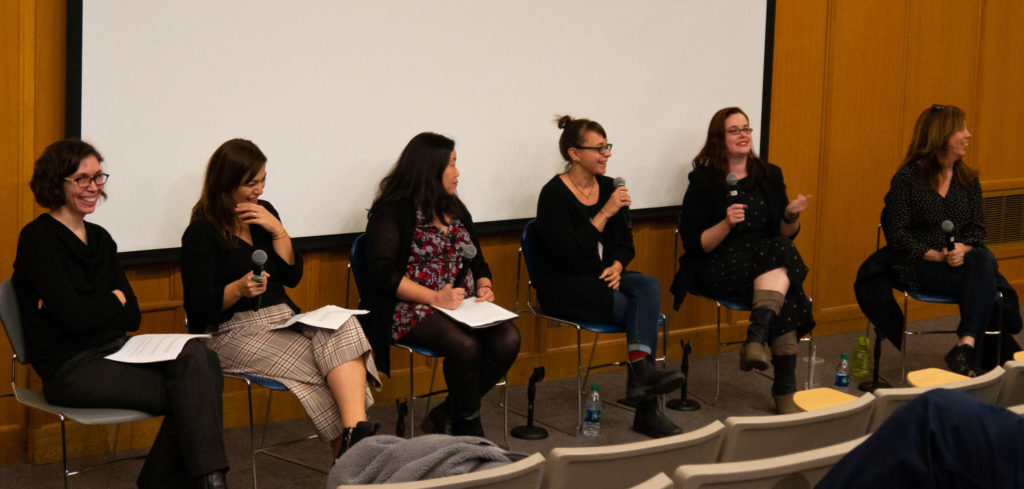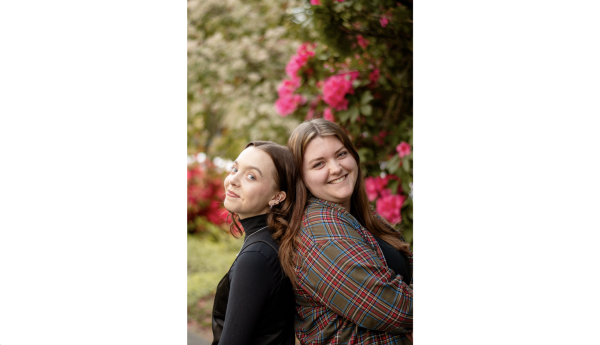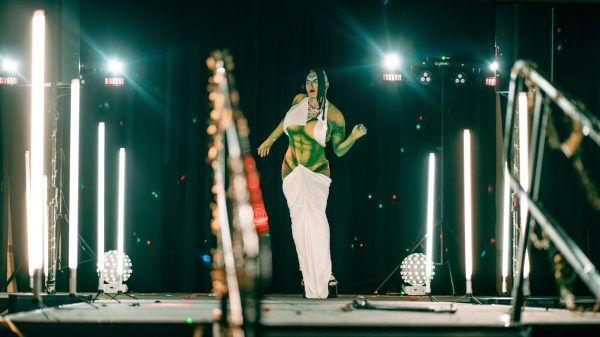#MeToo In Review
Sirin Aysan, Ellen Huang, Tana Kupczak, Lacey Leavitt, Kristen Schaffer (from left) discuss prevalent issues involving women in film in the wake of the #MeToo Movement during a panel moderated by Professor Justine Barda.
When Ashley Judd accused Harvey Weinberg of sexual assault and when Alyssa Milano tweeted her influential tweet recommending that all victims of sexual assault reply “me too,” they had no way of knowing that this would spark a social movement that would change the world.
“In the last 13 months, we have seen incredible momentum around issues of gender discrimination, sexual harassment and sexual assault in the entertainment world and beyond,” Justine Barda, a film professor at Seattle University, said “This included the rise and spread of the ‘me too movement’ on social media, the surfacing of thousands of allegations of sexual misconduct and the launch of hundreds of investigations. Some resulted in criminal charges, and dozens of high profile men being fired or stepping down from their positions, in some cases to be replaced by women.”
On Nov. 17, Seattle U’s Film Department invited five women involved in the film industry to speak to the public about what has happened in the past year since the first stories of the #metoo movement broke out.
“As a crew member for years before I was a producer, I did not have the tools back then when I did see horrible sexual harassment happen on set, which I did, on productions that were obviously by men at the top,” Lacey Leavitt, producer of independent films such as Laggies and Lucky Them, said. “Obviously, I wasn’t in a position of power, I didn’t feel like I had the opportunities to speak and I would hope that now if I was just starting as a crew member, I would feel so much more power to actually discuss that with somebody. It has given me so many ideas, as a producer, to make sure that there are resources.”
This being said, not all of the consequences of the #metoo movement have been positive.
“We have also seen in recent months some backlash and some resistance, making clear that we are in the early stages of what is likely to be a long and difficult struggle,” Barda said. “But still, it has been a pretty remarkable year.”
While backlash is to be expected as a byproducts of any social movement, it is a safe assumption to say that neither Ashley Judd nor Alyssa Milano could have expected the #notallmen movement to become a response. A quick search on Twitter reveals countless tweets bearing suggestions such as, “You need better male friends that you can actually trust” or men complaining that they are being mistreated or unnecessarily judged. These abrasive responses have made many women afraid that they might not be given opportunities to be in professional fields.
“On the daily, there’s such a pervasive culture of permissiveness (in the film industry),” Tania Kupczak, a local designer and set decorator for films and live performances, said. “The thing I see over and over again and feel myself is how utterly replaceable you feel as a crew member and that anything you say or do might jeopardize that job and future work. I don’t think that we have gotten to a point that as a whole we address that issue yet.”
Kupczak also expressed gratitude for the supportive “bubble” that is the Seattle art community.
Despite the liberal qualities of our beloved city, the film industry is not perfect. This is a sentiment that Leavitt shared, saying, “one of the other things about Seattle that is a little unique is that…in terms of independent film, [the] two most prolific and well-known directors are women…That said, that’s really only for narrative independent films. That’s not the case for the commercial world here, which is how most of our crew work for most of the time… And it’s an incredibly white industry, there are very few people of color in significant positions, even in Seattle.”
The two women that Leavitt mentioned are Lynn Shelton, the director of “Outside In” and a couple of episodes of shows such as “Mad Men” and “New Girl,” and Tracy Rector, director of over 350 film shorts featuring Native American tribes around the United States.
“I think that one thing that has changed is that cis, white, hetero men are nervous now. I say that jokingly, but I think it has actually created some self-reflection for a different lens for cultural norms that have existed for a long time,” Kupczak said. “People [are] questioning, why is this that way? Why do I have to behave this way? Why can’t I speak up? and I think as a group, in a production, as a community, we are starting to believe people too. I think that that is a huge, huge change.”
Despite the many monumental improvements that have occurred in the past couple of months, there are still more changes that must happen, not only in the film industry but also in all other employment fields. This is a message that one of the speakers, Sirin Aysan, a Turkish-American accomplished director and producer of different forms of film and media, brought up.
“If you google ‘top ten directors in any country’, you find maybe one or two [female directors] out of 15. These things are going to change, I hope at some point, with students going into these fields. But I am still being offered lesser pay then my male college, these things hopefully will change little by little. But there is a lot of work to do for all of us I think”
Taylor may be reached at
[email protected]










